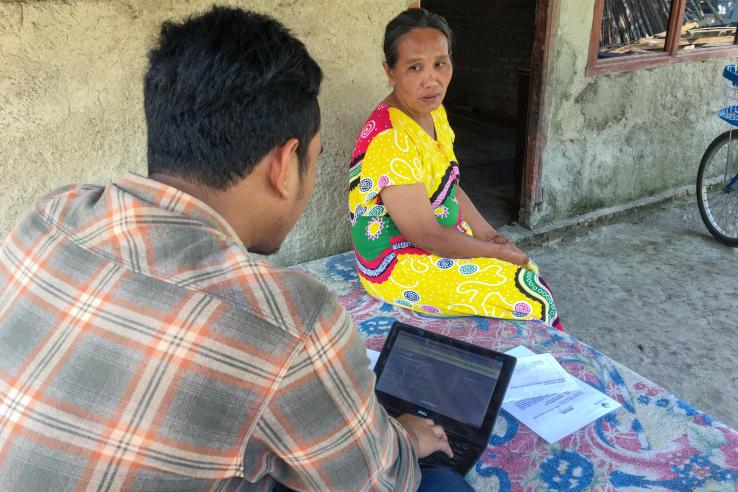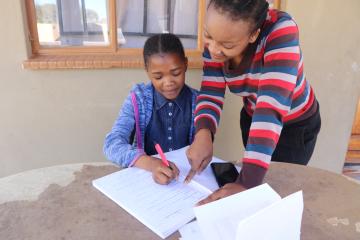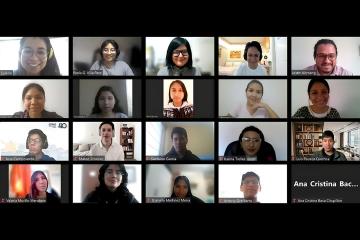
20 for 20: Fostering ethical research practices through collaboration

This is the fourth post of J-PAL’s 20 for 20: Partner Voices blog series, where we showcase stories of results and impact with our partners to celebrate our twentieth anniversary. Read on to learn more about Mohammad Zeqi Yasin’s, head of research at the Research Institute of Socioeconomic Development, experience collaborating with J-PAL Southeast Asia on a large-scale exploratory survey of vocational school teachers.
Since 2020, I have been working as the head of research at the Research Institute of Socioeconomic Development (RISED), a think tank based in Indonesia. In this role, I, alongside two other project officers, had the opportunity to collaborate with J-PAL Southeast Asia (SEA) on a large-scale exploratory survey of vocational school teachers, which aimed to investigate the impact of innovative vocational teacher training on improving teacher's vocational sectoral knowledge and teaching practice.
In the exploratory stage, we conducted more than 1,600 phone survey interviews with teachers. Our collaboration with J-PAL SEA was a pivotal experience for our team—it presented us with the opportunity to gain valuable insights into ethical and effective research practices, and gain new skills in data collection in field and primary research.
Learning about the best practices for ethical research
To kick off our collaboration, J-PAL SEA conducted a training with our research staff and enumerators focused on the essential ethical research practices employed by J-PAL, known as "minimum must-do's" (MMDs). The training covered a wide range of standard protocols in administering phone survey— including:
- Research principles around human subjects, child protection, and gender mainstreaming;
- Phone survey techniques and other survey instruments;
- Simulation of data storing and cleaning, and data confidentiality training (e.g. data encryption and data de identification).
The training prompted our team to apply MMDs in research practices that we had not previously used before. For example, it underscored the importance of ensuring data security, which involves using standardized tools such as laptops equipped with reliable anti-malware and antivirus software, as well as implementing data encryption measures to avoid data misuse and maintain confidentiality of sensitive data. The training also provided us with new insight on how to incorporate enumerators’ feedback to enhance the survey instruments. In addition, this training emphasized the significance of ethical considerations during field surveys when working with human subjects, a dimension often overlooked by research organizations. In particular, from the beginning of the training J-PAL SEA emphasized the importance of being aware of the sensitivities when interacting with certain groups, such as children and women.
Applying the research practices in the field
The survey collection process spanned over three months. At first, it was challenging to keep up with the great amount of new information, standard operational procedures, and terminologies. However, we were able to apply the MMDs during the phone surveys due to our adamance and the guidance from J-PAL SEA. The J-PAL SEA research team actively collaborated with us to provide guidance on issues that arose during the field survey and were also open to receiving constructive feedback from the field officers.
One of the challenges that arose during the online survey period was some enumerators were not able to meet their target of 200 respondents. This issue came up due to inactive phone numbers in the list of possible respondents and difficulties following up with respondents even after they secured an interview appointment.
To mitigate this, the J-PAL SEA and RISED teams collaboratively held a debrief session, which created a useful platform to exchange best practices on how some enumerators managed to complete more interviews. Additionally, enumerators who already reached the targeted 200 interviews were given the option to survey another list of respondents. This strategy helped the team to collectively achieve a total of 1,600 completed interviews.
Opportunity: Fostering the development of domestic research institutions
Overall, this experience provided us with insights into the best practices for conducting ethical research and encouraged us to employ the MMDs as standard procedures in our future projects. Looking ahead, as an international research institution with extensive experience in data collection, J-PAL SEA can foster the development of domestic research institutions by sharing its knowledge and encouraging research institutions to incorporate rigorous data collection standards into their practices.


